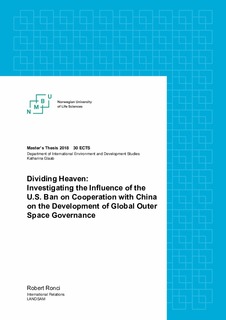| dc.contributor.advisor | Glaab, Katharina | |
| dc.contributor.author | Ronci, Robert Jay | |
| dc.date.accessioned | 2018-10-12T08:13:19Z | |
| dc.date.available | 2018-10-12T08:13:19Z | |
| dc.date.issued | 2018 | |
| dc.identifier.uri | http://hdl.handle.net/11250/2567759 | |
| dc.description.abstract | This thesis investigates how the U.S. policy barring NASA’s cooperation with China, colloquially known as the “Wolf amendment”, is influencing the developing system of global space governance. As rapid technological advancements improve access to outer space, policymakers around the world are crafting institutions that will regulate humanity’s access, participation, and activities in the final frontier. However, the rapid pace of technological advance is creating policy challenges much faster than policymakers can address them. With the two most significant spacefaring countries legally barred from working together in major space projects, the challenge international policymakers face becomes greater. This research utilizes a complex systems approach to identify how the Wolf amendment is influencing the evolutionary trajectory of global space governance. Congressional hearing transcripts, legal documents, personal letters, research reports, and public statements were investigated using a qualitative thematic analysis to identify the manner in which the Wolf amendment exerts influence, as well as the trends and patterns occurring in the political systems within which the amendment is embedded. Findings reveal that the persistence of the Wolf amendment’s influence forces the U.S. - China relationship to remain primarily competitive, rather than cooperative, in space exploration activities. Global space policy development is trending toward the pursuit of lessrigid voluntary norms rather than firm international treaties. As international space policymaking becomes increasingly decentralized, the policies of perceived leaders will remain key drivers of norm and infrastructure development. With U.S. policymakers preventing participation in joint activities with China, the creation of multiple spheres of influence becomes inevitable. Such a division of influence will likely lead to a persistently fragmented and competitive environment in outer space. This outcome would exacerbate challenges for international policymakers working to secure the sustainable usage of outer space, but also create opportunities for a wider range of space actors. | |
| dc.description.sponsorship | This thesis investigates how the U.S. policy barring NASA’s cooperation with China, colloquially known as the “Wolf amendment”, is influencing the developing system of global space governance. As rapid technological advancements improve access to outer space, policymakers around the world are crafting institutions that will regulate humanity’s access, participation, and activities in the final frontier. However, the rapid pace of technological advance is creating policy challenges much faster than policymakers can address them. With the two most significant spacefaring countries legally barred from working together in major space projects, the challenge international policymakers face becomes greater. This research utilizes a complex systems approach to identify how the Wolf amendment is influencing the evolutionary trajectory of global space governance. Congressional hearing transcripts, legal documents, personal letters, research reports, and public statements were investigated using a qualitative thematic analysis to identify the manner in which the Wolf amendment exerts influence, as well as the trends and patterns occurring in the political systems within which the amendment is embedded. Findings reveal that the persistence of the Wolf amendment’s influence forces the U.S. - China relationship to remain primarily competitive, rather than cooperative, in space exploration activities. Global space policy development is trending toward the pursuit of lessrigid voluntary norms rather than firm international treaties. As international space policymaking becomes increasingly decentralized, the policies of perceived leaders will remain key drivers of norm and infrastructure development. With U.S. policymakers preventing participation in joint activities with China, the creation of multiple spheres of influence becomes inevitable. Such a division of influence will likely lead to a persistently fragmented and competitive environment in outer space. This outcome would exacerbate challenges for international policymakers working to secure the sustainable usage of outer space, but also create opportunities for a wider range of space actors. | nb_NO |
| dc.language.iso | eng | nb_NO |
| dc.publisher | Norwegian University of Life Sciences, Ås | nb_NO |
| dc.rights | Attribution-NonCommercial-NoDerivatives 4.0 Internasjonal | * |
| dc.rights.uri | http://creativecommons.org/licenses/by-nc-nd/4.0/deed.no | * |
| dc.subject | Complex Systems | nb_NO |
| dc.subject | Outer Space | nb_NO |
| dc.subject | US-China Relations | nb_NO |
| dc.subject | Complexity Theory | nb_NO |
| dc.subject | Global Space Governance | nb_NO |
| dc.title | Dividing heaven : investigating the influence of the U.S. ban on cooperation with China on the development of global outer space governance | nb_NO |
| dc.type | Master thesis | nb_NO |
| dc.source.pagenumber | 87 | nb_NO |
| dc.description.localcode | M-IR | nb_NO |

